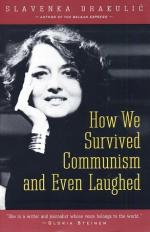|
This section contains 476 words (approx. 2 pages at 400 words per page) |

|
How We Survived Communism and Even Laughed Summary & Study Guide Description
How We Survived Communism and Even Laughed Summary & Study Guide includes comprehensive information and analysis to help you understand the book. This study guide contains the following sections:
This detailed literature summary also contains Topics for Discussion and a Free Quiz on How We Survived Communism and Even Laughed by Slavenka Drakulić.
How We Survived Communism and Even Laughed was written by author and main character Slavenka Drakulic. Drakulic is a renowned Croatian journalist, novelist and non-fiction writer who, in this book, writes about her experiences under communism and with Eastern European women who lived and suffered under communism. Eastern Europe was ruled by communist regimes, mostly by the Soviets but also by Tito, the dictator of Yugoslavia, for decades. During this time, communism reformed the mindset of many Eastern Europeans. It deprived them of hope, of the ability to expect that things would get better in life, of the will to resist arbitrary and tyrannical power, and of knowledge of the far better material circumstances in the Western world. A theme throughout the book is that communism is not merely a political system but a mindset and that the mindset outlived the regimes that produced it.
Slavenka is born in Croatia in 1949 and goes to school in Zagreb where she studies comparative literature and sociology. She becomes a well-known journalist between 1982 and 1992, writing often about women's issues but from time to time criticizing the communist regime. She becomes internationally known amongst the feminist community and writes about the treatment of women in Eastern Europe, which she views as a true horror. However, Eastern European women are not merely the victims of sexism, but of regimes that prevent them from having even the most basic material means by which to express themselves—make-up, dresses, and even tampons. Further, they make Eastern European women so poor that there are not enough houses for privacy or enough appliances to prevent women from being slaves to their chores.
The book contains nineteen chapters which do not proceed in chronological order. Instead, they are brief character and event sketches meant to illustrate the broader themes of the book. Throughout these chapters we are introduced to many characters, practically all of them women who suffer, live and often die under Eastern European tyrannies. However, few of these women are main characters. The only constant personal presence besides Slavenka is the communitist party, regime and mentality which pervades Eastern European life, mental and physical. The stories and events often focus on the intense connection Slavenka discovers between material things and expressing one's spirit, individuality and femininity. Many chapters cover the significance of particular commodities—soup, washing machines, coffee, pizza, glass jars, make-up, and even a mink coat. The material deprivations of the communist regimes of Eastern Europe repress individuality not only directly through tyranny and forced equalization, but through the mass impoverishment of Eastern European societies. While Slavenka maintains many leftist political positions—feminism, animal rights, environmentalism and a strong sense of social justice, she finds communism a nightmare and freely acknowledges the great benefits of liberal capitalism, not only for the body but for the soul.
Read more from the Study Guide
|
This section contains 476 words (approx. 2 pages at 400 words per page) |

|



